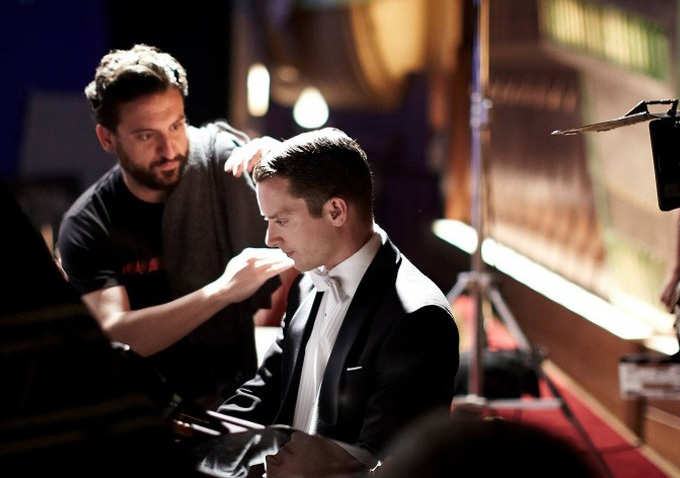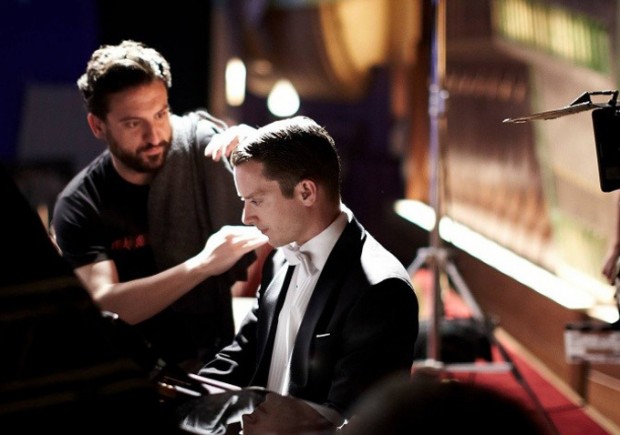
Grand Piano is a film that is so masterfully done that it seems silly one would ever have doubts that the story could be pulled off. Much of that has to do with the work of the blossoming director Eugenio Mira, who actually created animatics of the film to get everyone on the same page. Starring Elijah Wood as a wunderkind pianist trying to get over his past failures performing live, this thriller never relents once it is pushed down the hill.
At Fantastic Fest last fall I had the opportunity to speak with Mira, Wood, and co-star Don McManus about the serendipity they felt with the film, the type of piano they went after and how it turned into an essential part of the story, appreciation of music after the film, what Fantastic Fest means to all of them, and much more. There are no spoilers and I encourage you to read this before or after seeing the film, which is already on VOD and hits theaters in limited release this weekend. Read on for the full interview below, as well as a recent 50-minute conversation between Wood and Mira.
The Film Stage: First off, Elijah Wood, you seem to be a constant presence at Fantastic Fest. Have you been here since the beginning and what drew you here to begin with?
Elijah Wood: I had actually heard of the festival for years before I came the first time. My first time was in 2010. My brother had lived here for a while and had been here multiple times before I ever went. So I was chomping at the bit to come to the festival. Partially because I love Austin. I’ve been coming to Austin for over 15 years. I’ve spent a lot of time in the Alamo Drafthouse. I know a lot of the characters around the festival. There was a sense of familiarity already but then there was also this great celebration of movies that I had heard so much about. All the kinds of films that I love so much. So that was the draw. And that’s actually where I met Eugenio for the first time. That Fantastic Fest in 2010. Nacho [Vigalondo] as well. Eugenio was here with Agnosia.
Eugenio Mira: Yep!
Wood: So in some ways, I don’t know if I would have been involved in Grand Piano had it not been for Fantastic Fest. It’s all full circle. Here we are in 2013 having missed Fantastic Fest last year because of this movie. We were literally… there was a dinner with Nacho, me, and Eugenio in Barcelona during the closing night party of Fantastic Fest and we’re getting pictures from my brother and are just like, “what the f*ck?”
Mira: We had our own private Fantastic Fest.
Don McManus: I had never been to Fantastic Fest, but hearing them in Barcelona talk about it, there was a whole mythology. [Laughs] There was a whole world!
Mira: It’s hard to explain to people.
It is! It’s really hard.
Mira: I like to say this. It’s like a secret society that is open to everybody. There’s no secret. You can see the pictures. People go nuts when they see pictures of Fantastic Fest on the internet. “What the hell? Is that Bill Pullman?” It’s hard to contextualize.
Getting back to the film itself, this film obviously revolves around this one particular piano. I’m curious, what was the piano? Did you try and get a particular piano? Did you try for something grand or was it really just more of a prop?
Mira: I have to say I was obsessed with going for a Bosendorfer. The fact that it looks like a black cat and is one of the largest pianos. The first time I got to see one was recording the soundtrack of a movie The Totenwackers and they had these two Bosendorfer pianos. When I stepped into the studio there was 16 musicians waiting on me to record it. I saw them and I just didn’t know what they were. I sat down and I tried it and fell in love with it. That was back in 2006. I’ve never told y’all this. So I fell in love with it and then I forgot about it. We were discussing pianos with the writer, Damien Chazelle, and he never mentioned any kind of brand. My producers came up and said, well, we could go with Yamaha, Kawai, etc. Of course they were interested, but to me, it’s like, “Yamaha?” The word itself is like, really?
Wood: Yeah. It’s not very classical.
Mira: And we did just a tiny bit of research and we found that this particular Bosendorfer, the same model that is only one century old, it was specifically developed for [Franz] Liszt, the composer, because he needed an extra octave. That extra octave has an extra set of black keys. So even the white keys are black.
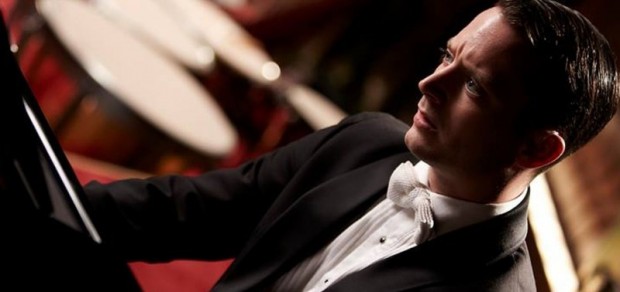
So that even ties directly into the movie.
Mira: Totally! So you have all these connotations of this crazy guy creating the most impossible-to-play things and needing another instrument. Pushing the boundaries. That was so, so good.
McManus: But, that’s essential to the plot. I didn’t know that was true.
Mira: Yeah. Well, I mean I fell in love with that piano and that helped build the character of the mentor for me. That he had two mentors, and one was Tom Selznick.
There just seems to be so many coincidences around this film. How you met Elijah and this piano. It’s insane.
Mira: I’m so aware that in this business, if this turns into one thing in life, I’m fine. We won’t talk about that. We keep moving and hopefully we will be able to put this into other projects 5 or 10 years from now.
Wood: There’s a lot of serendipity.
Mira: Yeah. We were overwhelmed by that. Everything that could go well, it went incredibly well. We didn’t come to it from the lazy perspective where we sit and, oh, that looks amazing. No! We worked our ass off. But in life, that doesn’t grant anything. But it’s the only way to go. You cannot afford to be lazy. But if you work your ass off, and we all did, and it’s synchronized, maybe we can take a little bit of credit for that. We are very aware that there is something extra. I think it’s in the movie. There’s some magic there that as a director I cannot take the credit for.
McManus: The planning was amazing. The year before I auditioned for a part in Rodrigo Cortes’s film, Apartment 143, and it didn’t happen. Which was fine.
Mira: But he was such a big part because he told me, “You really should check this guy out. He’d be perfect.” He loves you.
McManus: And the next year I heard back and it was like, “Really? From that?” I had forgotten about that audition.
Mira: He was perfect and Rodrigo was like, “I told you.” [Everyone laughs]
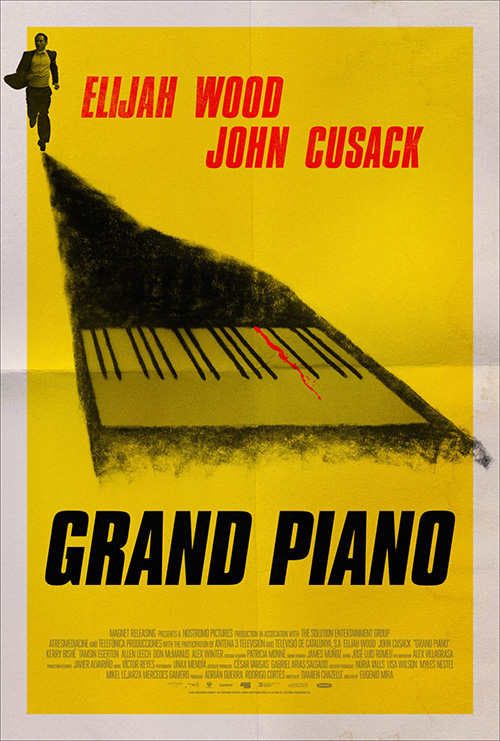 So, this role really exposes the actors and the cast to this kind of music, the orchestral and piano scores. I feel like music is one of those things where if you’re exposed to enough of it, and even if it’s for a job and you’re basically forced to listen to it, you do form an appreciation for it.
So, this role really exposes the actors and the cast to this kind of music, the orchestral and piano scores. I feel like music is one of those things where if you’re exposed to enough of it, and even if it’s for a job and you’re basically forced to listen to it, you do form an appreciation for it.
McManus: Oh, yeah!
How much did that stay with you after? Do you listen to orchestral music now?
McManus: I do! Well, first of all, I conduct now when I listen to music.
[Everyone laughs]
McManus: I do! I’m sitting and my hands are just [motions like a conductor]. I’ll see people going, “What is he doing?”
Mira: But that’s beautiful, man. That’s beautiful.
McManus: Well I’ve got to thank [coach and double Tobias Gossman] for that.
Mira: He did a great job with you.
Wood: I haven’t listened to more classical music since filming but what I have noticed is due to that rigorous schedule and playing so much there, my understanding of playing has increased so that now if I hear something I can imagine where the hands are.
McManus: Wow.
Wood: I can imagine what the hands are doing. That’s all just in my mind now.
Mira: I’m so proud of him taking piano lessons. From what I’ve seen, he’s just got a natural ability to understand lower, higher. Like a theremin thing. It’s a very basic premise but it works. If you can understand how to go up and down in keys, then you can write music. And if you can write music, you understand what to do with your hands.
McManus: It’s that easy. It’s really that easy.
[Everyone laughs]
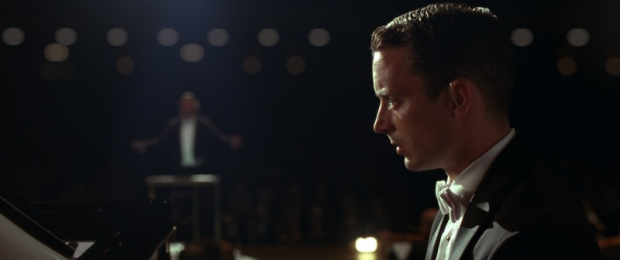
I don’t have that at all. I’m a very visual person and a lot of that stuff is just in the atmosphere.
Mira: But if you’re visual, let me tell you, because I’m in both worlds, there is a moment where this wall just drops and suddenly you’re like, “Oh!” My sister is a genius and she told me once, the only thing she learned from her teacher who was this 80-year-old guy, that in sequential art, everything that has to do with music and be expressed with stuff, there’s two forces. One, creating the tension. The other is the resolution of tension. The more you wait to go for the resolution, it builds up and you get uncomfortable. That’s how you find success. The more you get back to the original plan, easier for everybody. No disturbing. You’re not going to lose the tension of anybody. But if you are bold enough to don’t get back, you’re getting to a very perverted and greedy world. So in cinema, it’s the same. You sit down to write the script and you try to stay away from boring. It’s those two forces and once you understand that you can break down anything. Even a painting. So you’re closer than you think.
Obviously you know people at this festival. I’m wondering how easy it was to get into this festival. And what kind of cut did you send in? A finished cut? And early cut?
Wood: The way that it happened, we didn’t actually submit to Fantastic Fest. Tim [League], who’s a dear friend of our, had seen a screening at Cannes as a market screening and he emailed you.
Mira: Yeah, he emailed me, “I saw the movie and I loved it. I want it to be in the festival.” It would have been the same had we known each other or not known each other at all.
Wood: But the reality is that it’s important to know that while we have a lot of friends at the festival and friends that get into the festival, ultimately it comes down to whether the movie is good or not. The movie never would have made it had we not done our job.
Mira: No, totally. I can give you an example. The last movie I made, Agnosia, which is a movie I love, I was concerned about the fact that it…
Wood: Wasn’t perfect for the festival.
Mira: It wasn’t normal. I warned them. “Guys, I want you to know that there’s a long life ahead of us to do a lot of stuff.” There may be a project about chimpanzees going back in time and kidnapping Benjamin Franklin, for example.
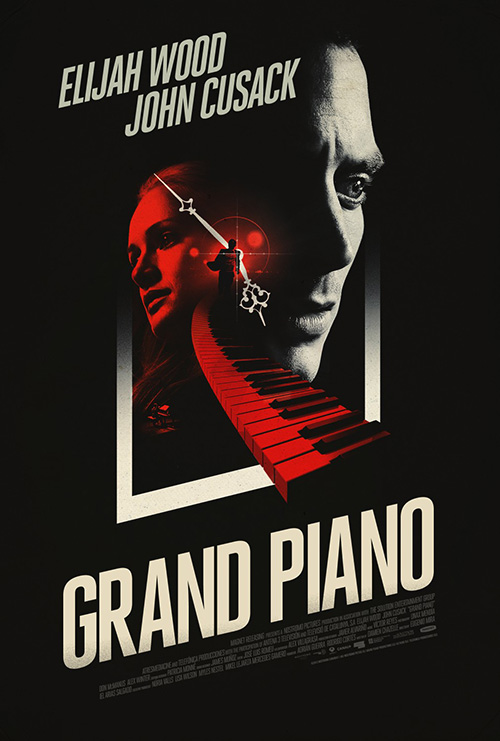 I want to see that movie!
I want to see that movie!
Mira: Yeah, you want to see that movie. But this is not that kind of movie. Agnosia was a 19th century Mediterranean gothic era. It’s about other interests I have but definitely not fantastic. And Tim let me know. “We’re not taking this movie because you’re a friend of ours. It’s because we really dig it. We thought it was amazing.” And he had the balls to take the microphone and make this kind of disclaimer before the movie. They basically said we won’t apologize for this movie. We love it so deal with it. But yes, I’m very aware of all this. I have a project now that isn’t up this alley but I’ve seen films that aren’t necessarily genre that play here. They go after what they love. For example, Bullhead.
Wood: Michel Gondry’s film as well.
Oh yes!
Mira: Tim’s a very big supporter of films like Bullhead. So I trust them. And I’ll do the same for them. When I have a film that maybe isn’t fitting, I’ll let them know. To me, it only adds more responsibility. After three movies, with this one and what we’ve put together, I get back home tomorrow and wake up and it’s like, OK, I made these things. What’s going to happen? If I’m healthy, four decades of working and figuring out what to do. That’s the challenge. What am I going to bring back to Fantastic Fest? To me, that’s how I feel. It’s not about disappointing. I just want to add something extra. Push the envelope. Hopefully we’ll keep doing that.
Grand Piano is now on VOD and in theaters.

